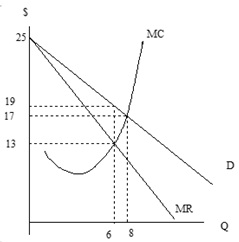Question 1. Consider each of the following industries and explain why you would OR would not expect it to exhibit large economies of scale. Answer in 2-4 sentences for each industry.
A. Aircraft manufacturing
B. Higher education
C. Accounting services
Question 2. Suppose a perfectly competitive industry operating in a long run equilibriumfaces an increase in demand (i.e., the curve shifts upward). Describe the steps by which a competitive market insures increased output by answering the following questions in 1-2 complete sentences each.
Following the industry demand increase:
a. What is the impact on the demand curve facing an individual firm in the short run?
b. What happens to output produced by an individual firm in the short run?
c. What happens to profit earned by individual firms in the short run?
d. What happens to the number of firms in the industry in the long run?
e. Illustrate the effects you describe in parts (a-d) above with a carefully labeled graph.
Question 3. Use the graph below

A. Give the price ____ and quantity ____ that will result if the industry represented above is monopolistic.
B. Give the price ____ and quantity ____ that will result if the industry represented above is perfectly competitive.
C. The monopolist’s power is never absolute. Instead, a monopolist’s isolation from competition is a matter of degree. Give a condition upon which such monopoly power depends and EXPLAIN it in your own words. Answers should be 3-5 sentences.
Question 4. Below are some possible combinations of rice and fish for people living on the Islands of Alpha andBeta.Suppose the Alphas currently produce and consume 10 pounds of rice and 60 pounds of fish. The Betas currently produce 15 pounds of fish and 25 pounds of rice. Each island can produce any linear combination in between the points of producing only one type of good.
|
Alpha Island
|
|
Beta Island
|
|
Rice
(Pounds)
|
Fish
(Pounds)
|
|
Rice
(Pounds)
|
Fish
(Pounds)
|
|
0
|
80
|
|
0
|
40
|
|
40
|
0
|
|
40
|
0
|
A. What is the opportunity cost of 1 pound of rice on Alpha Island?
B. What is the opportunity cost of 1 pound of rice on Beta Island?
C. Which island has the comparative advantage in rice production?
D. Suppose that the Alphas propose a trade in which they specialize in fish and give the Betas (who would specialize in rice) 15 pounds of fish and receive 10 pounds of rice in return. Would it be rational to agree?